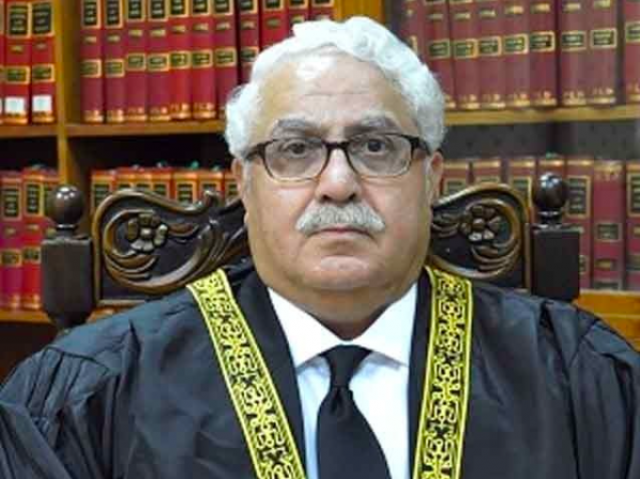Ex-SC judge found guilty of misconduct
SJC recommends president to dismiss him from service

The Supreme Judicial Council (SJC) led by Chief Justice of Pakistan Qazi Faez Isa has made history by holding former top court judge Mazahar Ali Akbar Naqvi guilty of misconduct.
The action came after Naqvi had already tendered his resignation as SC judge after submitting his replies to show-cause notices issued to him by the SJC.
The SJC announced its opinion on the retirement day of one of its members, Ameer Bhatti.
Similarly, another member, Justice Sardar Tariq Masood, retires on Friday (today). Balochistan High Court CJ Naeem Akhtar Afghan will be elevated to the SC.
In view of the SJC holding Naqvi guilty of misconduct and recommending his removal, he will no longer be entitled to receive pension and other benefits. Several lawyers believe that the opinion on Naqvi is the result of coordinated efforts by the executive, bar, and SJC.
When Naqvi resigned, the SJC wanted to continue its proceedings against him.
However, Attorney General for Pakistan (AGP) Mansoor Awan pointed out in a SC judgment given last year wherein it was held that the council could not proceed against a resigned or retired judge.
He informed the SJC that the government would move an intra-court appeal (ICA) against the judgment.
The matter was immediately scheduled before a larger bench, which held that the SJC proceedings could not be stopped even after the resignation of a respondent judge. One section of lawyers has serious reservations over this interpretation.
Naqvi was facing misconduct proceedings for the second time.
Complaints of misconduct against Naqvi were filed after he suggested taking suo motu notice over the delay in holding of the general elections for Punjab and Khyber-Pakhtunkhwa assemblies.
Unlike in the past, Naqvi's relationship remained tense with the ‘powerful circles' after this suo motu notice. He was also aligned with ex-CJP Umar Ata Bandial's group. An element of judicial politics cannot be ruled out.
It is also a fact that the allegations against Naqvi were also strong. Instead of responding to them, he preferred to resign at the eleventh hour.
Advocate Abdul Moiz Jaferii believed that the method through which Naqvi was investigated and the way the evidence against him came to light left much to be desired.
However, he added that it was clear that there were multiple incidents of gross misconduct on the former judge’s part. He pointed out that they included Naqvi’s unexplained property dealings, money transfers to his children by real estate brokers or contacts with political party leaders whose interests he was adjudicating.
“Naqvi should have been ousted for suspending the [former military ruler Pervez] Musharraf verdict, for ignoring jurisdiction when it came to the airtime ban on [MQM founder] Altaf Hussain, for doing whatever the establishment wanted and being promoted to the SC in the process,” he added.
"Instead, he was punished after falling foul of forces he was aligned with in the past, for mistaking his own authority, as well as for wrongly siding with and then relying on the support of [ex-CJP] Bandial."
Jaferii further said it was right to declare the former judge guilty, but the timing was wrong.
“The court has dismissed an agent from within itself. It has drawn a red line. Let’s see how many others are across it."
A statement issued by the SJC, which met on February 29 and March 1 this year, read that the allegations levelled against SC and high court judges were publicised.
“A number of judges have expressed concern that if they respond to such allegations the same may be construed as misconduct because the Code of Conduct, dated 2 September 2009 issued by the Supreme Judicial Council, in its Article-V states that a judge should not seek publicity. The Supreme Judicial Council deliberated upon the matter and was of the opinion that if a reply or clarification is issued by or on behalf of a judge if it does not violate Article-V. However, since concerns have been expressed by judges, it was agreed that the following be added to Article-V of the Code of Conduct: ‘If an allegation is publicised against a judge he may respond to it.’ Therefore, Article -V of the Code of Conduct was amended to read as under: ‘Functioning as he does in full view of the public, a judge gets thereby all the publicity that is good for him. He should not seek more. In particular, he should not engage in any public controversy, least of all on a political question, notwithstanding that it involves a question of law. However, if an allegation is publicised against a judge he may respond to it.”
The SJC rendered its opinion in respect of the nine complaints against Naqvi under Article 209(6) of the Constitution. The council was of the opinion that he was guilty of misconduct and should have been removed from the office of judge.
Advocate Hafiz Ahsaan Ahmad Khokhar said this was the first time in the judicial history of the country when a judge of the SC, even though he had resigned, the SJC continued its proceedings against him under Article 209 of the Constitution and recommended to president for his removal on ground of misconduct which would deprive him from pension and other benefits.
Khokhar continued that Naqvi would also be considered to be a judge removed from the SC.
He said that the present findings of the SJC against their one of their fellows would set a new line of action for the judges who would be found facing complaints of misconduct and definitely improve the transparency as well as internal accountability standards in the superior judiciary.
“If a matter of misconduct will be started, it will reach its ultimate conclusion on either side.”Khokhar further said now it was important for the SJC to decide all pending applications as per its rules of misconduct filed against the superior court judges and rule on them at the earliest as that would definitely help in uplifting the dignity of the country’s judiciary.



















COMMENTS (1)
Comments are moderated and generally will be posted if they are on-topic and not abusive.
For more information, please see our Comments FAQ